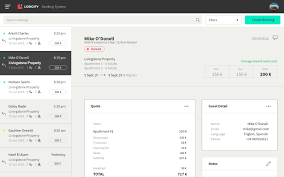Hotel owners and managers all face the same concern – how to increase the rentability and profit of the property. No matter how popular a hotel brand becomes, this remains one of their top priorities. Right now when the market size of the hotel sector is bigger than ever (1.22 trillion according to Statista), beating the competition becomes more challenging every day.
Best Tips to Increase Your Hotel’s Rentability
Amid endless day-to-day operations like accommodating guests, as well as managing reservations and employees, it’s hard to figure out the best strategies. That being said, here is a list of 7 amazing tactics you can use to increase interest in your hotel business.
1. Use a vacation rental booking engine
Do you have hotels at different locations or maybe multiple unit types? Are you trying to handle several accounts or many different reservations? Even if you have a tiny hospitality business, managing and maintaining reservations, as well as communicating with customers takes a lot of time – and it gets tricky real fast.
The daily chores for any hotelier include answering questions to interested parties, scheduling reservations, keeping track of bookings, writing reports, etc. Thankfully, there’s a solution to all this – an all-in-one vacation rental booking engine like Lodgify.
Whether you’re managing one hotel or several units, you need a quality vacation rental booking engine filled with helpful features. This will not only make your job easier, but it will also save you tons of time, not to mention eliminate many of the human errors you’ve done in the past.
Using booking management engines like Booking or Airbnb is a common practice among hoteliers. However, you should not limit it to this only. By using tools like Lodgify, you can get real-time insight into all of your bookings, appointments, payments, and rates across different websites and booking systems.
To eliminate errors and make things easier, as well as maintain high satisfaction with your guests, you need a centralized management system. Such a system will empower your hotel to increase direct bookings, synchronize various calendars and rates across different accommodation rental sites, as well as allow guests to book directly with you without using intermediaries.
Chatbot – Real-time Advice by Crisp
Moreover, with more people booking online than ever before, you also need to focus on user experience when it comes to customer service. Being online means there are very few in-person touchpoints between your business and its audience. And while this might boost efficiency, particularly on mobile, people still need their questions answered.
Consider using a chatbot platform to better engage with online customer queries. These tools mean your business is available to the needs of the user 24/7, providing real-time advice that can answer thousands of questions at any one time. Many chatbots can also be programmed to support multiple languages, meaning you can help guests visiting your hospitality business from all over the world.
2. Store data in a documenting software
Documentation is a big part of a hotel’s business. From the legal documents and the reservations to the private and personal information of guests, there’s a lot of data to keep and store safely when you manage a hotel.
By using top-rated documenting software, hotels can store, view, and edit all documents easily and safely. The right product can help you share this data with the parties it is intended for, use it to improve your business, as well as implement the best marketing strategies to attract more guests.
3. Work hard to understand your market
Knowing your market i.e. the people who are most likely to visit your hotel, is the key to attracting more guests. How else will you know to appeal to your audience?
Based on your hotel’s characteristics and your abilities, you should leverage the data you collect for your target market to better reach out to them. This includes thorough and frequent analysis of the market, communication with your current and past guests, and tracking the competition. And of course, it includes market segmentation to tweak your strategies.
SocialTables defines hotel market segmentation as a ‘’way of dividing potential guests into groups based on a set of shared characteristics’’. Such analysis will point to race, age, income, and different personality traits that will show you which group of people is most likely to book at your hotel.
When you know who your customer is, you know how to appeal to them more effectively. Based on the data you collect from them, as well as the data you have for your hotel, you can create a marketing strategy that works better than the one you have right now.
This will, in turn, find more people who’d be interested to visit your hotel. It will find people who want to visit your location, look for hotels with sizes like yours, request your existing amenities, have a budget to cover accommodation expenses, etc.
4. Sell experience over transactions
People today look for more than just cozy rooms and affordable rates when they book accommodation. With so many choices at their disposal, it’s easy to get picky. This is why hoteliers need to put the most unique, differentiating aspects of the hotel at the forefront. This should be the thing that guests see at once, before anything else.
What makes your hotel better than others? What makes it unique? What kind of experience can people expect from the moment when they arrive for their stay till their check-out?
There’s a big difference between offering a quality experience and a transaction. The latter means that you’re simply offering room and board – and nothing else. A lot of the time, a unique experience is more important to guests than fancy designs and a classy website.
When it comes to promoting experience, your hotel’s reputation is key. People can best imagine themselves in your hotel if they read what others have written about it. So, focus on providing people with dedicated service and friendly support, but also use your reputation to help them imagine their stay at your hotel.
5. Use high-quality images
In this technology-driven world, people expect to see hotels’ offerings in the form of visuals to consider staying there. Long gone is the time when guests knocked on your door just because they walked by or a friend told them about a ‘’nice stay there’’. Today, even if people call or book directly, they’ll want to see what you’re offering first.
Naturally, this means one thing – images.
Few other things captivate potential guests in addition to images, but this is probably one of the priorities they have. People want to see their room, the hotel’s lobby, its amenities, and immerse themselves into the experience to know what to expect. Research shows that 67% of consumers in any business consider detailed and quality images to carry more weight than a long description.
Yes, descriptions are important, especially since they show people what features your hotel offers. However, before it all, you need to make sure that you post the best images of your hotel and its amenities. In addition to this, according to a Visual Web Optimizer study, quality large images boost bookings by 9.46%.
The higher the quality of your images, the higher your chances of getting a new guest. But, keep it real – fake images are never a good idea!
6. Optimize for mobile users
Did you know that almost half of the bookings today are made online? For over a decade now, it has been essential for accommodation owners to put their business online for people to see. But, things have changed a lot during this time. Now that people use mobiles more often than desktop devices, the bookings made online are more frequent than ever. TravelDailyMedia reports that up to 80% of last-minute hotel bookings are made on mobile devices.
What does this mean for you?
It means that, if you want more bookings and higher revenue, you need to focus on making your website optimized for mobile users. If you haven’t done so already, this is a must today. People expect a fast-loading, sleek, and professional mobile experience from their accommodation. They also expect fast response, professional service, as well as all the information they need at their fingertips. If you don’t optimize for mobile, you’re missing out on a big opportunity to reach a much wider audience.
7. Perform revenue and reservation analytics
You can aim to get more profit and reservations, but this won’t happen unless you know where you stand – and who your customers are. Keeping track of your reservations and revenue is key to creating any kind of successful strategy for the future. As you run your day-to-day operations, gather useful data that will show you who your customers are and what they like.
This can include everything from information about current guests to conversations with potential visitors. Gather useful data from everything that could help you form a strategy. For example, your guest’s passport can show you the age of your target guests. Their messages and questions on social media channels and in your inbox can show you what people expect to get when they come to your hotel. Lastly, their testimonials and ratings can show you what you need to keep and what you need to remove to make things more appealing.
Final thoughts
Nowadays, many tools and techniques can help you increase the hotel revenue and attract more people. Thanks to analytics, quality marketing strategies, tools like rental engines, and documentation software – hoteliers can start increasing their profit right away. All it takes is a bit of time, some dedication, and you can gradually grow your business to attract more guests.














Comments